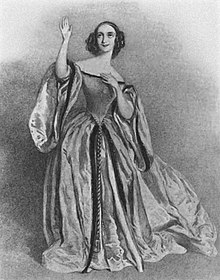Fanny Tacchinardi Persiani
Fanny Tacchinardi Persiani (Italian pronunciation:
Life and career
Born in Rome as Francesca Felicita Maria Tacchinardi, she was the daughter of cellist and tenor Nicola Tacchinardi, a very eminent teacher of vocal technique[1] who trained her voice from childhood, and his first wife, Maria Angiola Tacchinardi, a relative. [2][3] She had two older siblings, Carolina and Ulisse and a younger sibling, Enrichetta "Elisa". She was the half-sister of Guido Tacchinardi who was born from her father's third marriage. In 1830 she married the composer Giuseppe Persiani (1799–1869), and as she embarked on her stage career she added his surname to her own. She made her stage début at Livorno in Giuseppe Fournier-Gorre's Francesca da Rimini in 1832. She soon appeared in Venice, Florence, Milan, Naples, and other Italian cities, in Tancredi, La gazza ladra, Il pirata, L'elisir d'amore and other operas.

Donizetti heard her in 1833, and described her voice as "rather cold, but quite accurate and perfectly in tune."[4] He chose her to create title roles in three of his operas, Rosmonda d'Inghilterra with Gilbert Duprez as Enrico II (at Florence in February 1834),[5] Pia de' Tolomei (Venice, 1837, a work conceived expressly for her from the beginning[6]), but most notably that of Lucia in Lucia di Lammermoor in Naples in 1835, one of the immortal roles of Romantic opera. Duprez was her Edgardo. Donizetti (remarking that she was "not the brightest star") told in a letter how in rehearsal she made an almighty row (which terrified Duprez) because, after Lucia's finale (the Mad Scene) there remained the finale of Edgardo ('Fra poco a me ricovero') before the curtain fell, displacing the final applause from herself to the tenor.[7] She also sang Lucia in the first Paris performance, in December 1837, opposite Rubini (for whom Edgardo became one of his most celebrated roles), a performance received with acclaim bordering on hysteria.[8] She was furthermore in the London premiere in April 1838.

She made her Paris début at the
Persiani was admired above all as Lucia, Amina, Rosina and Linda.
Mme Tacchinardi Persiani retired from the stage in 1859, and thereafter she and her husband gave vocal training in Paris, where she died.
Her voice was described as sweet and light with a brilliant upper register and having remarkable agility. She is said to have been able to sing a given aria several times in succession, each time with a different cadenza. She was one of the first sopranos of the "nightingale" category, a harbinger of others such as Jenny Lind, Adelina Patti, Nellie Melba, Amelita Galli-Curci, etc. She could hit a high F (F6) effortlessly.[15]
References
Notes
- ^ a b Ashbrook and Lo Presti 1986, p.216 note 114.
- ^ "TACCHINARDI, Fanny in "Dizionario Biografico"". www.treccani.it (in Italian). Retrieved 2020-10-27.
- ^ "TACCHINARDI, Nicola in "Dizionario Biografico"". www.treccani.it (in Italian). Retrieved 2020-10-27.
- ^ Source cited in Ashbrook and Lo Presti 1986, p.216 n. 114, also quoting descriptions by Severini and Chorley. [1]
- ^ Ashbrook and Lo Presti 1986, 75-76.
- ^ Ashbrook and Lo Presti 1986, 103, and p.227 note 99.
- ^ Susan Rutherford, The Prima Donna and Opera, 1815-1930 (Cambridge University Press 2006), p. 171-72.
- ^ Ashbrook and Lo Presti 1986, 124.
- ^ Ashbrook and Lo Presti 1986, 128.
- ^ Helio Gori, 'Giovanni Battista Rubini: An Abridged Biography', Escola Livre di Canto Lirico (Brazil) [2] Archived 2009-02-01 at the Wayback Machine.
- ^ Ashbrook and Lo Presti 1986, 155-56.
- ^ Mrs Pitt Byrne, Gossip of the Century (Downey, London 1899), II, 157-62. [3]
- ^ Ashbrook and Lo Presti 1986, 145.
- ^ Quoted in Philip Taylor, Anton Rubinstein: a Life in Music (Indiana University Press 2007) p.30.
- ^ Gonzague Saint Bris, La Malibran, page 48.
Sources
- Appolonia, Giorgio (February 1996), "Fanny Tacchinardi Persiani", Donizetti Society Newsletter Number 67
- Ashbrook, William (1990), "Popular success, the critics and fame: the early careers of Lucia di Lammermoor and Belisario", Cambridge Opera Journal, 2:65-81 (Cambridge University Press).
- Ashbrook, William; Fulvio Lo Presti (1986), Donizetti: La Vita (EDT srl 1986). ISBN 88-7063-041-2
- Ciarlantini, Paola (1988), Giuseppe Persiani e Fanny Tacchinardi: Due Protagonisti del Melodramma Romantica (Il Lavoro editoriale. ISBN 978-88-7663-176-4
- Mancini, R.; J-J Rouvereux (1986), Le guide de l'opéra, les indispensables de la musique, Fayard. ISBN 2-213-01563-5
- La voce e l'arte di Fanny Tacchinardi-Persiani, nei giudizi critici della sua epoca (1832-1858) https://belcantoitaliano.blogspot.com/2019/12/la-voce-e-larte-di-fanny-tacchinardi.html
